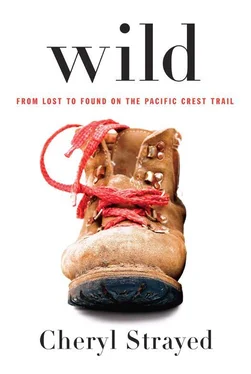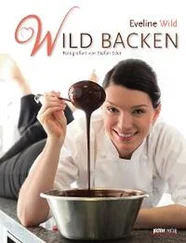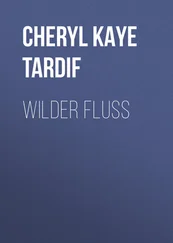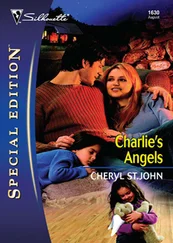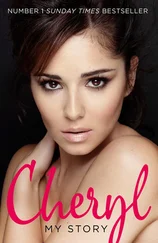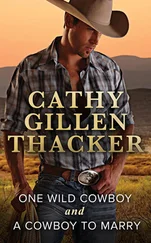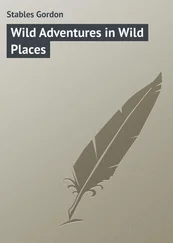Cheryl Strayed - Wild
Здесь есть возможность читать онлайн «Cheryl Strayed - Wild» весь текст электронной книги совершенно бесплатно (целиком полную версию без сокращений). В некоторых случаях можно слушать аудио, скачать через торрент в формате fb2 и присутствует краткое содержание. Год выпуска: 2012, ISBN: 2012, Жанр: Современная проза, на английском языке. Описание произведения, (предисловие) а так же отзывы посетителей доступны на портале библиотеки ЛибКат.
- Название:Wild
- Автор:
- Жанр:
- Год:2012
- ISBN:978-0-307-95765-8
- Рейтинг книги:4 / 5. Голосов: 1
-
Избранное:Добавить в избранное
- Отзывы:
-
Ваша оценка:
- 80
- 1
- 2
- 3
- 4
- 5
Wild: краткое содержание, описание и аннотация
Предлагаем к чтению аннотацию, описание, краткое содержание или предисловие (зависит от того, что написал сам автор книги «Wild»). Если вы не нашли необходимую информацию о книге — напишите в комментариях, мы постараемся отыскать её.
Wild — читать онлайн бесплатно полную книгу (весь текст) целиком
Ниже представлен текст книги, разбитый по страницам. Система сохранения места последней прочитанной страницы, позволяет с удобством читать онлайн бесплатно книгу «Wild», без необходимости каждый раз заново искать на чём Вы остановились. Поставьте закладку, и сможете в любой момент перейти на страницу, на которой закончили чтение.
Интервал:
Закладка:
“I’ll be back in the morning,” I said to my mother. I looked over at Eddie, half lying on the little vinyl couch. “I’ll come back with Leif.”
When she heard his name, she opened her eyes: blue and blazing, the same as they’d always been. In all this, they hadn’t changed.
“How can you not be mad at him?” I asked her bitterly for perhaps the tenth time.
“You can’t squeeze blood from a turnip,” she’d usually say. Or, “Cheryl, he’s only eighteen.” But this time she just gazed at me and said, “Honey,” the same as she had when I’d gotten angry about her socks. The same as she’d always done when she’d seen me suffer because I wanted something to be different than it was and she was trying to convince me with that single word that I must accept things as they were.
“We’ll all be together tomorrow,” I said. “And then we’ll all stay here with you, okay? None of us will leave.” I reached through the tubes that were draped all around her and stroked her shoulder. “I love you,” I said, bending to kiss her cheek, though she fended me off, in too much pain to endure even a kiss.
“Love,” she whispered, too weak to say the I and you . “Love,” she said again as I left her room.
I rode the elevator and went out to the cold street and walked along the sidewalk. I passed a bar packed with people I could see through a big plate-glass window. They were all wearing shiny green paper hats and green shirts and green suspenders and drinking green beer. A man inside met my eye and pointed at me drunkenly, his face breaking into silent laughter.
I drove home and fed the horses and hens and got on the phone, the dogs gratefully licking my hands, our cat nudging his way onto my lap. I called everyone who might know where my brother was. He was drinking a lot, some said. Yes, it was true, said others, he’d been hanging out with a girl from St. Cloud named Sue. At midnight the phone rang and I told him that this was it .
I wanted to scream at him when he walked in the door a half hour later, to shake him and rage and accuse, but when I saw him, all I could do was hold him and cry. He seemed so old to me that night, and so very young too. For the first time, I saw that he’d become a man and yet also I could see what a little boy he was. My little boy, the one I’d half mothered all of my life, having no choice but to help my mom all those times she’d been away at work. Karen and I were three years apart, but we’d been raised as if we were practically twins, the two of us equally in charge of Leif as kids.
“I can’t do this,” he kept repeating through his tears. “I can’t live without Mom. I can’t. I can’t. I can’t.”
“We have to,” I replied, though I couldn’t believe it myself. We lay together in his single bed talking and crying into the wee hours until, side by side, we drifted off to sleep.
I woke a few hours later and, before waking Leif, fed the animals and loaded bags full of food we could eat during our vigil at the hospital. By eight o’clock we were on our way to Duluth, my brother driving our mother’s car too fast while U2’s Joshua Tree blasted out of the speakers. We listened intently to the music without talking, the low sun cutting brightly into the snow on the sides of the road.
When we reached our mother’s room at the hospital, we saw a sign on her closed door instructing us to check in at the nurse’s station before entering. This was a new thing, but I assumed it was only a procedural matter. A nurse approached us in the hallway as we walked toward the station, and before I spoke she said, “We have ice on her eyes. She wanted to donate her corneas, so we need to keep the ice—”
“What?” I said with such intensity that she jumped.
I didn’t wait for an answer. I ran to my mother’s room, my brother right behind me. When I opened the door, Eddie stood and came for us with his arms outstretched, but I swerved away and dove for my mom. Her arms lay waxen at her sides, yellow and white and black and blue, the needles and tubes removed. Her eyes were covered by two surgical gloves packed with ice, their fat fingers lolling clownishly across her face. When I grabbed her, the gloves slid off. Bouncing onto the bed, then onto the floor.
I howled and howled and howled, rooting my face into her body like an animal. She’d been dead an hour. Her limbs had cooled, but her belly was still an island of warm. I pressed my face into the warmth and howled some more.
I dreamed of her incessantly. In the dreams I was always with her when she died. It was me who would kill her. Again and again and again. She commanded me to do it, and each time I would get down on my knees and cry, begging her not to make me, but she would not relent, and each time, like a good daughter, I ultimately complied. I tied her to a tree in our front yard and poured gasoline over her head, then lit her on fire. I made her run down the dirt road that passed by the house we’d built and then ran her over with my truck. I dragged her body, caught on a jagged piece of metal underneath, until it came loose, and then I put my truck in reverse and ran her over again. I took a miniature baseball bat and beat her to death with it, slow and hard and sad. I forced her into a hole I’d dug and kicked dirt and stones on top of her and buried her alive. These dreams were not surreal. They took place in plain, ordinary light. They were the documentary films of my subconscious and felt as real to me as life. My truck was really my truck; our front yard was our actual front yard; the miniature baseball bat sat in our closet among the umbrellas.
I didn’t wake from these dreams crying. I woke shrieking. Paul grabbed me and held me until I was quiet. He wetted a washcloth with cool water and put it over my face. But those wet washcloths couldn’t wash the dreams of my mother away.
Nothing did. Nothing would. Nothing could ever bring my mother back or make it okay that she was gone. Nothing would put me beside her the moment she died. It broke me up. It cut me off. It tumbled me end over end.
It took me years to take my place among the ten thousand things again. To be the woman my mother raised. To remember how she said honey and picture her particular gaze. I would suffer. I would suffer. I would want things to be different than they were. The wanting was a wilderness and I had to find my own way out of the woods. It took me four years, seven months, and three days to do it. I didn’t know where I was going until I got there.
It was a place called the Bridge of the Gods.
2
SPLITTING
If I had to draw a map of those four-plus years to illustrate the time between the day of my mother’s death and the day I began my hike on the Pacific Crest Trail, the map would be a confusion of lines in all directions, like a crackling Fourth of July sparkler with Minnesota at its inevitable center. To Texas and back. To New York City and back. To New Mexico and Arizona and Nevada and California and Oregon and back. To Wyoming and back. To Portland, Oregon, and back. To Portland and back again. And again. But those lines wouldn’t tell the story. The map would illuminate all the places I ran to, but not all the ways I tried to stay. It wouldn’t show you how in the months after my mother died, I attempted — and failed — to fill in for her in an effort to keep my family together. Or how I’d struggled to save my marriage, even while I was dooming it with my lies. It would only seem like that rough star, its every bright line shooting out.
By the time I arrived in the town of Mojave, California, on the night before I began hiking the PCT, I’d shot out of Minnesota for the last time. I’d even told my mother that, not that she could hear. I’d sat in the flowerbed in the woods on our land, where Eddie, Paul, my siblings, and I had mixed her ashes in with the dirt and laid a tombstone, and explained to her that I wasn’t going to be around to tend her grave anymore. Which meant that no one would. I finally had no choice but to leave her grave to go back to the weeds and blown-down tree branches and fallen pinecones. To snow and whatever the ants and deer and black bears and ground wasps wanted to do with her. I lay down in the mother ash dirt among the crocuses and told her it was okay. That I’d surrendered. That since she died, everything had changed. Things she couldn’t have imagined and wouldn’t have guessed. My words came out low and steadfast. I was so sad it felt as if someone were choking me, and yet it seemed my whole life depended on my getting those words out. She would always be my mother, I told her, but I had to go. She wasn’t there for me in that flowerbed anymore anyway, I explained. I’d put her somewhere else. The only place I could reach her. In me.
Читать дальшеИнтервал:
Закладка:
Похожие книги на «Wild»
Представляем Вашему вниманию похожие книги на «Wild» списком для выбора. Мы отобрали схожую по названию и смыслу литературу в надежде предоставить читателям больше вариантов отыскать новые, интересные, ещё непрочитанные произведения.
Обсуждение, отзывы о книге «Wild» и просто собственные мнения читателей. Оставьте ваши комментарии, напишите, что Вы думаете о произведении, его смысле или главных героях. Укажите что конкретно понравилось, а что нет, и почему Вы так считаете.
